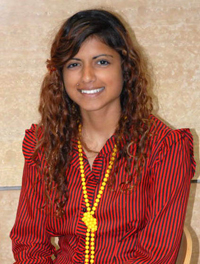 |
Paige Mathew |
Established in 2001, the BRIN program was created to expose students to serious biomedical research, build a statewide biomedical research infrastructure between undergraduate and graduate institutions and to strengthen each undergraduate institution’s infrastructure and increase its capacity to conduct cutting-edge biomedical and behavioral research.
Today, we meet Paige Mathew, one of the new BRIN scholars on campus.
What should we know about you?
I am a junior nutrition science major at the University of Nebraska-Lincoln with minors in chemistry and mathematics. I love to volunteer for children’s camps and I have been on Hurricane Katrina service trips. Next year, I will be involved in the honors program, the Nebraska Human Reseach Institute. I also will be a teaching assistant for an educational psychology class, a volunteer at BryanLGH hospital and a resident assistant for university housing. I currently am an editor for a satirical newspaper and in my free time, I like to run, knit and meet new people.
What or who influenced your interest in science?
I went to an all-girls high school that strongly encouraged women to break the stereotypical mold and excel in areas that aren’t typically dominated by females, namely math and science. I would watch the news and hear about amazing medical breakthroughs all over the world and I knew that if I had a talent in science, I could contribute to it.
What is it about science that excites you?
I love that science is a universal language and people all over the world can collaborate on different projects working towards the greater good of science. Science phenomena is not always straightforward and researchers must be problem solvers. It is a constant challenge, but these problems are just an invitation for motivated individuals that have the drive and the willpower to solve them.
Will you pursue a career in science? If so, what do you hope to accomplish?
I hope to study genetic disorders and find treatments for diseases. If the science community could unite to find these cures, our differences would seem menial if not nonexistent. I hope to work for the CDC (Center of Disease Control) or the FDA (Food and Drug Administration). I would love to travel to remote towns and villages all over the world, assess their typical diets and environment, and then return to the lab and find ways that the people can regularly get the nutrients they are lacking with the resources they have. I hope I can use my science knowledge towards philanthropic efforts.
Why is it important to have programs like BRIN?
Academic classes normally don’t give students enough hands-on opportunities to convince them to pursue a career in research. This program has given me the opportunity to get my feet wet in the lab, as well as allow me to learn about other facets of research going on in Nebraska’s facilities. This allows students to make a much more informed decision when they are considering options for the future.